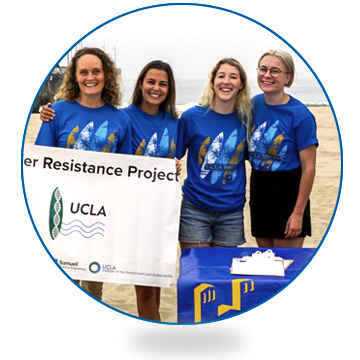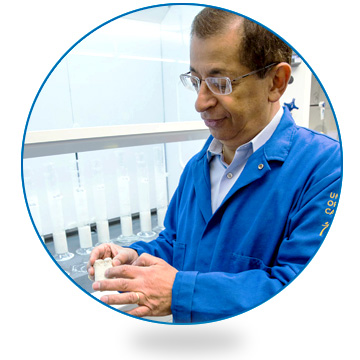
How do we save the planet for future generations? We can start by cleaning up our oceans and bringing potable water to areas that desperately need it–which is exactly what the engineers at UCLA Samueli are pursuing.

Wiping out gnarly bacteria in oceans
Jennifer Jay
Professor of civil and environmental engineering
This past spring, doctoral student Megyn Rugh found bacteria responsible for several difficult-to-treat infections at surfing beaches in Southern California.
Read Full Story
The bacteria, methicillin-resistant Staphylococcus aureus (MRSA), a known entity in nearby waters, can cause skin infections and is resistant to several antibiotics. Some people can even carry MRSA on their skin or in their noses without showing symptoms.
As a surfer herself who grew up riding waves north of Los Angeles at Morro Bay Rock, Rugh teamed up with her advisor Jennifer Jay, a professor of civil and environmental engineering, to study how this pathogen colonizes in surfers.
“I surf and have always loved the ocean, but, unfortunately, I have had many friends get various eye or sinus infections after surfing, especially during winter,” said Rugh. “Studying local surfers and water quality is the perfect convergence of public health, water quality issues, and marine conservation.”
Sea Grant, a federal-university partnership that works to create and maintain a healthy coastal environment provided seed money for the research, and the Jay Research Group also partnered with Surfrider Foundation, Heal the Bay, and the Institute of the Environment and Sustainability at UCLA.
According to Jay, this study addresses an important gap in scientific literature.
“Related research shows that swine and poultry workers who work in facilities with the animals also have levels of exposure to antibiotic-resistant bacteria, but the relationship has not yet been proven to be causal,” said Jay.
“A study done over time with surfers can reveal a colonization following a particular exposure when water is impaired.”
This summer, Jay Research Group members, along with summer interns and volunteers, are reaching out to the local surfing community. Surfers and a control group are being asked to donate nasal swabs and answer questions about water exposure, health, and antibiotic use through the fall and winter. DNA will be extracted from one nasal swab while another will be used to culture antibiotic resistant pathogens.
While the short-term goal is to protect the health of surfers and other ocean swimmers, the team hopes to address the issue of rising antibiotic resistance to help keep our oceans clean.
To support the effort, visit: spark.ucla.edu/surf

Fixing rural America’s water problem
Yoram Cohen
Professor of chemical and biomolecular engineering
Along with being a professor of chemical and biomolecular engineering, Yoram Cohen, a desalination expert, is committed to pioneering clean water initiatives for all. Cohen founded the Water Technology Research Center and the Center for Environmental Risk Reduction–through which he has implemented many cutting-edge technologies.
Read Full Story
One of his notable inventions is his Smart Integrated Membrane System, or SIMS, which provides on-site water purification and transforms contaminated groundwater into drinking water. SIMS uses reverse osmosis to purify up to 27,000 gallons of agricultural runoff water per day. The desalination technology is providing clean drinking water for tens of thousands in rural California. Cohen also runs the world’s leading R&D program in reverse-osmosis membrane desalination (a process invented at UCLA 50 years ago).
His goal? Equal access to clean water. “It’s just unimaginable that in California we have people without access to clean drinking water,” said Cohen.
Cohen’s research in water treatment methods helps alleviate the effects of drought conditions, especially in areas that are not part of an integrated water infrastructure, and can be easily replicated in other arid locations. The SIMS technology is cost-effective as well, costing approximately $40 to $50 per household per month.
Small, rural communities have already seen the benefits of Cohen’s SIMS technology, as it supplies roughly 80,000 people in the San Joaquin Valley with clean drinking water. To make the technology even more accessible, SIMS is a mobile unit that fits inside of a cargo container and can be operated by a smartphone, so that UCLA technicians can conduct maintenance without having to travel.
Next up for Cohen’s team is to transfer their technology to much smaller systems to serve remote and disadvantaged communities in the Salinas Valley whose water supplies are contaminated with nitrates, which can damage body cells and are linked to cancer.
Cohen is also working on the UCLA Sustainable LA Grand Challenge, whose goal is to make Los Angeles water independent by 2050. “I want to see things happen, not just find ways to solve problems from the technical viewpoint,” said Cohen. In the meantime, he continues to take on some of California’s toughest sustainability problems–turning goals into gallons.
